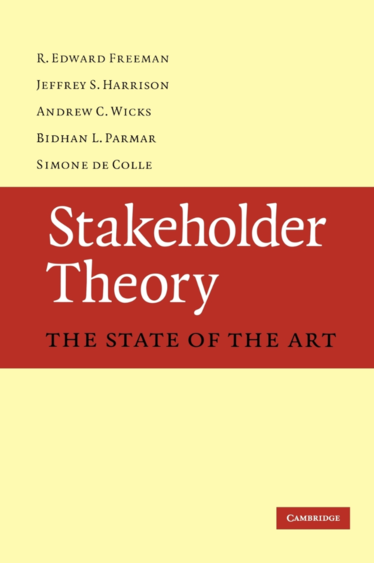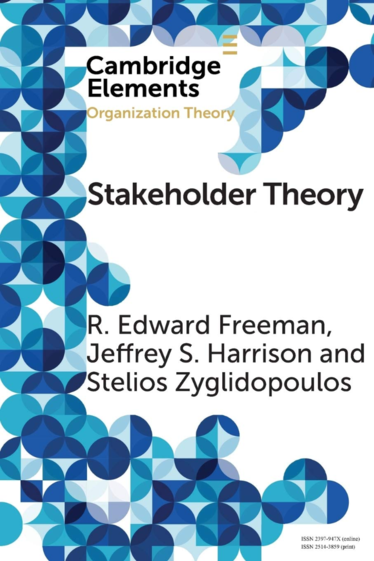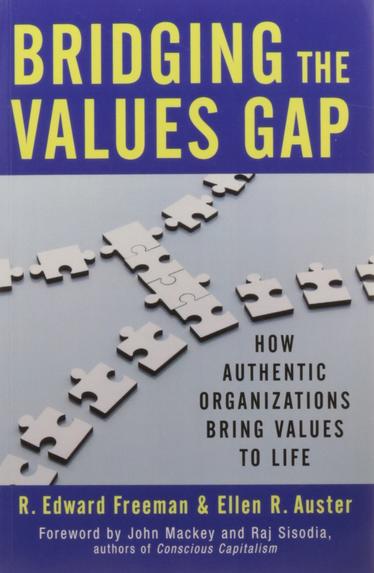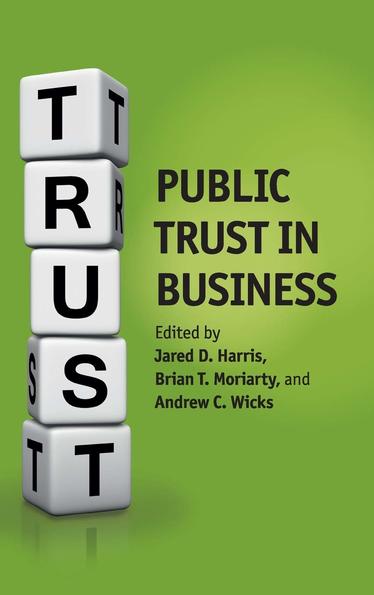
Stakeholder Theory
Publications - Stakeholder Theory
Publications
Scholars around the globe have published over 36,000 articles and books using Stakeholder Theory.
Key Books
Most Cited Articles (2016-present)
Jones, T. M., Harrison, J. S., & Felps, W. (2018). How applying instrumental stakeholder theory can provide sustainable competitive advantage. Academy of Management Review, 43(3), 371–391.
Freudenreich, B., Lüdeke-Freund, F., & Schaltegger, S. (2020). A stakeholder theory perspective on business models: Value creation for sustainability. Journal of Business Ethics, 166(1), 3–18.
Freeman, R. E., Dmytriyev, S. D., & Phillips, R. A. (2021). Stakeholder theory and the resource-based view of the firm. Journal of Management, 47(7), 1757–1770.
Barney, J. B. (2018). Why resource-based theory’s model of profit appropriation must incorporate a stakeholder perspective. Strategic Management Journal, 39(13), 3305–3325.
Dmytriyev, S. D., Freeman, R. E., & Hörisch, J. (2021). The relationship between stakeholder theory and corporate social responsibility: Differences, similarities, and implications for social issues in management. Journal of Management Studies, 58(6), 1441–1470.
Amis, J., Barney, J., Mahoney, J. T., & Wang, H. (2020). From the editors—Why we need a theory of stakeholder governance—And why this is a hard problem. Academy of Management Review, 45(3), 499–503.
Waheed, A., & Zhang, Q. (2022). Effect of CSR and ethical practices on sustainable competitive performance: A case of emerging markets from stakeholder theory perspective. Journal of Business Ethics, 175(4), 837–855.
Bridoux, F., & Stoelhorst, J. W. (2022). Stakeholder governance: Solving the collective action problems in joint value creation. Academy of Management Review, 47(2), 214–236.
Gao, H., Li, K., & Ma, Y. (2021). Stakeholder orientation and the cost of debt: Evidence from state-level adoption of constituency statutes. Journal of Financial and Quantitative Analysis, 56(6), 1908–1944.
Laplume, A., Walker, K., Zhang, Z., & Yu, X. (2021). Incumbent stakeholder management performance and new entry. Journal of Business Ethics, 174(3), 629–644.
Bettinazzi, E. L. M., & Feldman, E. R. (2021). Stakeholder orientation and divestiture activity. Academy of Management Journal, 64(4), 1078–1096.
Harrison, J. S., Felps, W., & Jones, T. M. (2019). Instrumental stakeholder theory makes ethically based relationship building palatable to managers focused on the bottom line. Academy of Management Review, 44(3), 698–700.
Olsen, T. D. (2017). Political stakeholder theory: The state, legitimacy, and the ethics of Microfinance in emerging economies. Business Ethics Quarterly, 27(1), 71-98.
Rubinelli, S., & Von Groote, P. M. (2017). Stakeholder dialogue as deliberation for decision making in health policy and systems: The approach from argumentation theory. American Journal of Physical Medicine & Rehabilitation, 96(2), S17-S22.
Bonnafous-Boucher, M., & Rendtorff, J. D. (2016). Stakeholder theory and ethics. Stakeholder Theory (pp. 67-78). Springer International Publishing.
Ketokivi, M., & Mahoney, J. T. (2016). Transaction cost economics as a constructive stakeholder theory. Academy of Management Learning & Education, 15(1), 123-138.
Kujala, J., Lehtimäki, H., & Myllykangas, P. (2016). Toward a relational stakeholder theory: Attributes of value-creating stakeholder relationships. Academy of Management Proceedings, 2016(1), 13609.
Jahn, J., & Brühl, R. (2016) How Friedman’s view on individual freedom relates to stakeholder theory and social contract theory. Journal of Business Ethics, 1-12.
Berman, S. L., & Johnson-Cramer, M. E. (2016). Stakeholder theory seeing the field through the forest. Business & Society, 1-18.
Beckman, T., Beckman, T., Khare, A., Khare, A., Matear, M., & Matear, M. (2016). Does the theory of stakeholder identity and salience lead to corporate social responsibility? The case of environmental justice. Social Responsibility Journal, 12(4), 806-819.
Moriarty, J. (2016). The demands of stakeholder theory for corporate governance. Business Ethics Journal Review, 4(8), 47-52.
Fassin, Y., de Colle, S., & Edward Freeman, R. (2016). Intra-stakeholder alliances in plant-closing decisions: A stakeholder theory approach. Business Ethics: A European Review, 26(2), 97-111.
Pandey, V., & Gupta, S. (2016). Understanding G2G e-government project impasse: a stakeholder theory perspective. Information Development, 33(4), 361-374.
Additional Key Articles
Jones, T. M., & Wicks, N. C. (2007). Convergent stakeholder theory. In Business Ethics and Strategy, Volumes I and II. Routledge.
Freeman, R. E., Phillips, R., & Sisodia, R. (2020). Tensions in stakeholder theory. Business & Society, 59(2), 213–231.
Schaltegger, S., Hörisch, J., & Freeman, R. E. (2019). Business cases for sustainability: A stakeholder theory perspective. Organization & Environment, 32(3), 191–212.
Rose, J., Flak, L. S., & Sæbø, Ø. (2018). Stakeholder theory for the e-government context: Framing a value-oriented normative core. Government Information Quarterly, 35(3), 362–374.
Barney, J. B., & Harrison, J. S. (2020). Stakeholder theory at the crossroads. Business & Society, 59(2), 203–212.
Bridoux, F. M., & Vishwanathan, P. (2020). When do powerful stakeholders give managers the latitude to balance all stakeholders’ interests? Business & Society, 59(2), 232–262.








